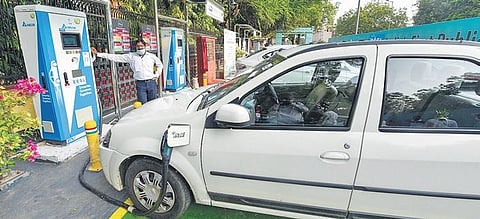

NEW DELHI: It has been nearly three years since India started pushing automakers to go green. However, electric vehicle penetration in India remains one of the lowest in the world, and whatever limited progress it had seen last year has now been disrupted by Covid-19 pandemic.
Most EVs in India are two-wheelers and e-rickshaws. According to official figures, over 1,52,000 units of electric two-wheelers were sold in India in 2019-20 as against 1.74 crore traditional two-wheelers sold during the year. In the electric four-wheeler segment, only 3,400 units were sold compared to over 27 lakh ICE-powered vehicles sold during the period.
In recent months, sales of EVs across segments took a big hit as Covid-19 pandemic disrupted demand and supply chain. JMK Research data shows that sales of high-speed EVs for July 2020 stood at 7,411 units, far less than 16,434 sold in January.
Centre and many state governments have come up with new policies promising financial incentives on purchasing electric vehicles. This way, the government feels, it will be able to combat the rising pollution level and reduce dependency on oil imports.
However, despite all the push the sector hasn’t really picked up. The biggest factor that continues to hamper the sector is insufficient charging infrastructure. According to an official figure from 2019, there were around 650 charging stations in India, significantly less than over 3 lakh in China.
Other factors such as limited options, lower mileage, higher dependency on imports, complicated taxation system have contributed to the slow growth of the sector. FICCI recently suggested a series of measures to ensure continuity of the EV growth roadmap and achievement of the targets as envisioned by the Government for the sector in the next decade.
Sulajja Firodia Motwani, co-chair of FICCI EV Committee and Founder-CEO of Kinetic Green said, “We should encourage existing auto component makers to invest in EV components and also to attract investment in India for EV and EV components, especially battery, powertrain components like electric motors, controllers, chargers, converters, etc. For this to happen, it is critical to take steps to create demand for EVs, otherwise, we will have a chicken and egg situation.”
What FICCI wants
FICCI has asked to continue with FAME II scheme till 2025, along with short term ‘Booster Incentives’ under Fame II for 12 months to enhance demand. It also wants the government to extend subsidy support for E2W and E3W with Swappable Battery to encourage EV eco-system creation.